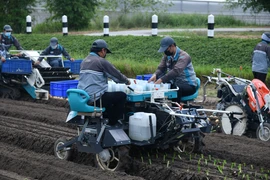The PM underlined that it is imperative to implementthe green transition across all sectors, and promote sustainable production andconsumption via all economic activities. This includes transport, energy, andinfrastructure.
New technologies and digital transformation will beinvaluable to this shift, but their responsible use and equitable access mustbe ensured, he said.
The PM affirmed that Thailand is actively implementing itslong-term low greenhouse gas emission development strategy, while realigningits national energy plan to shift consumption to clean energy, and also promoteenergy efficiency.
Thailand aims to increase the production of zero-emissionvehicles to 30% by 2030, while encouraging foreign investment in the electricvehicle sector, said Thavisin, adding that his country also plans to scale upsustainable agronomy to reduce climate change vulnerability and improvefarmers' well-being.
He said he is optimistic that these policies will help Thailandreach its national targets of reducing greenhouse gas emissions by 40% by 2030,achieving carbon neutrality by 2050, and net-zero emissions by 2065..
He also underlined the importance of environmental and ecosystemconservation, and highlighted that an environmentally sound financing mechanismwill be an indispensable tool for the green transition.
Thailand has raised 12.5 billion USD so far by issuingsustainability bonds to fund multiple projects, he said, adding that the governmentwill introduce sustainability linked bonds to boost the green bonds market.
On the occasion, the PM also introduced the Land Bridge project, which isdesigned to connect the Andaman Sea and the Indian Ocean to the Gulf ofThailand and the Pacific Ocean, improving connectivity in the southern Andamanregion, and reducing commute times going via the Strait of Malacca./.




























